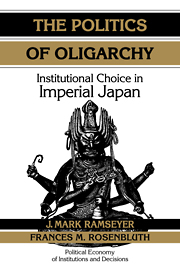Book contents
- Frontmatter
- Contents
- List of tables and figure
- Series editors' preface
- Acknowledgments
- CHAPTER 1 INTRODUCTION
- CHAPTER 2 THE COLLAPSE OF OLIGARCHY: FAILED ATTEMPTS AT CARTEL-MAINTENANCE
- CHAPTER 3 CONCESSION OR FACADE: THE MEIJI CONSTITUTION
- CHAPTER 4 ELECTORAL RULES AND PARTY COMPETITION: THE STRUGGLE FOR POLITICAL SURVIVAL
- CHAPTER 5 THE BUREAUCRACY: WHO RULED WHOM?
- CHAPTER 6 THE COURTS: WHO MONITORED WHOM?
- CHAPTER 7 THE MILITARY: MASTER OF ITS OWN FATE
- CHAPTER 8 FINANCIAL POLITICS
- CHAPTER 9 RAILROAD POLITICS
- CHAPTER 10 COTTON POLITICS
- CHAPTER 11 CONCLUSION: INSTITUTIONS AND POLITICAL CONTROL
- Notes
- References
- Index
CHAPTER 4 - ELECTORAL RULES AND PARTY COMPETITION: THE STRUGGLE FOR POLITICAL SURVIVAL
Published online by Cambridge University Press: 05 June 2012
- Frontmatter
- Contents
- List of tables and figure
- Series editors' preface
- Acknowledgments
- CHAPTER 1 INTRODUCTION
- CHAPTER 2 THE COLLAPSE OF OLIGARCHY: FAILED ATTEMPTS AT CARTEL-MAINTENANCE
- CHAPTER 3 CONCESSION OR FACADE: THE MEIJI CONSTITUTION
- CHAPTER 4 ELECTORAL RULES AND PARTY COMPETITION: THE STRUGGLE FOR POLITICAL SURVIVAL
- CHAPTER 5 THE BUREAUCRACY: WHO RULED WHOM?
- CHAPTER 6 THE COURTS: WHO MONITORED WHOM?
- CHAPTER 7 THE MILITARY: MASTER OF ITS OWN FATE
- CHAPTER 8 FINANCIAL POLITICS
- CHAPTER 9 RAILROAD POLITICS
- CHAPTER 10 COTTON POLITICS
- CHAPTER 11 CONCLUSION: INSTITUTIONS AND POLITICAL CONTROL
- Notes
- References
- Index
Summary
INTRODUCTION
The Meiji Constitution left a crucial element in the political process unspecified: the selection of Diet representatives. In the last chapter we outlined the logic behind the devolution of power from the oligarchs. In this chapter we explore how the shifting configuration of power influenced the choice of electoral rules. The choice of those rules – and the rules were adjusted several times – involved protracted negotiations among the oligarchs and the Peers, the political parties, the voters and indirectly the disenfranchised. Because electoral rules are at the very heart of political accountability, their evolving shape tells us something about who had power in the system, how much they had, and how they obtained it.
Although the oligarchs gave the Diet only limited powers in the Constitution, they remained concerned that the party politicians would gain popular support. Lest the politicians then demand more concessions, they established electoral rules that encouraged intra-party competition and thereby kept the parties weak. The party leaders mitigated this fratricidal competition by providing voters private goods, but the consequence was widespread corruption and in time voter disenchantment.
In this chapter we first describe the oligarchs' experiments with various electoral rules. We consider the consequences those rules had for the politicians and for their relationship with the oligarchs and the voters. In Section 2 we explore the initial choice of one- and two-member districts in 1889, and the switch to multi-member districts in 1900.
- Type
- Chapter
- Information
- The Politics of OligarchyInstitutional Choice in Imperial Japan, pp. 41 - 55Publisher: Cambridge University PressPrint publication year: 1995

